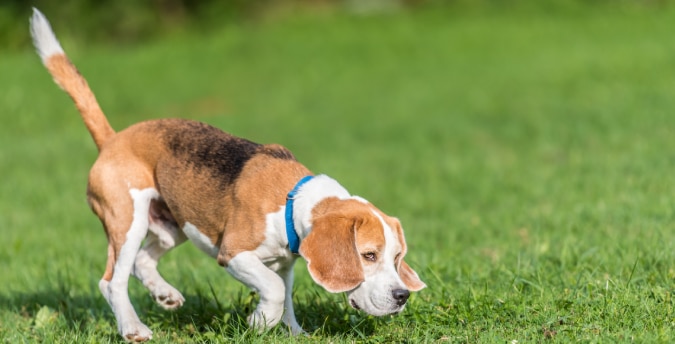How A Dog’s Sense Of Smell Works

Dogs show more sensitivity towards the odor than humans. Their olfactory lobes can detect any smell 10,000 times more accurately than us. Besides, their nostrils are structured in such a way that even when they exhale air, the inhalation process remains continuous. Furthermore, canine’s brains have 300 million olfactory receptors, and hence 40% of their brain functions to identify and memorize various odors. That’s the reason why you find your pet sniffing round the clock. In this article, we will discover how a dog’s sense of smell functions and help him in his life.
How Does Sniffing Help Your Dog?
Recognition
Dogs use their sense of smell to identify the location, people, and other animals. Our brain remembers various events by the sense of vision, and we use them to recognize the next time we come in contact with the same location or people. Likewise, canine’s brains store the smell sensed by their olfactory lobes and use them to identify various things and people. That’s the reason why your furry friend starts smelling you or any visitor when they enter the house in order to recognize them.
Communication
A powerful smelling sense of your pet is also the medium of interaction with other dogs. You might often find your dog busy sniffing the land when you take him outside for a walk or playing session. He might be reading the messages left by other dogs in the area by smelling their urine from the ground. Besides, your furry pet writes his own messages in the form of his urine. You do not need to worry as it is common in the world of furry animals and is considered one of their daily activities.
Detecting Danger
Dogs can often sense changes in environmental conditions, thanks to their powerful olfactory lobes. Decrease in the water level of the land and toxication of the air with harmful substances are some of the adverse changes canines can sense while sniffing the ground and surrounding atmosphere. That’s why army forces and rescue teams utilize this unique skill of dogs to forecast any possibility of catastrophes especially in remote locations where technical devices fail to function.
What Are Some Hazardous Effects Of Sniffing On Your Dog?
Sniffing is good for your dog and is also a routine activity for him. However, due to the polluted environment, your canine may suffer from some side effects of sniffing outdoor lands and unknown substances. Even a slight amount of toxic chemicals entering the respiratory tract of your pet can lead to severe allergic reactions. Moreover, while sniffing the ground, he might mistakenly inhale pathogens or parasites that can cause deadly diseases. So, it is advised for you to take adequate precautions before exposing your pet to the external environment so that your canine’s health does not deteriorate and he lives a healthy life.
How to Prevent Harmful Effects of Sniffing on Your Dog?
Vaccination
It is essential to complete your canine’s vaccination process before you introduce him to the outdoor world. This will save him from infectious diseases that can be caused by smelling other dogs. Besides, it protects your furry friend from attacks by common parasites like ticks.
Air Fresheners
If you use ordinary room fresheners, kindly stop their usage as they are loaded with chemicals that can be harmful to your pet’s health. Instead, you can use dog-safe air fresheners that are composed of safe materials. Utilization of such natural air fresheners also enhances your health and does not cause respiratory issues in the long term.
Regular Check-Ups
Once your canine is vaccinated, do not forget to regularly visit the veterinary clinic in a period of every three to four months. Regular check-ups, especially during the puppy stage, ensure your pet is not infected from any kind of severe disease and if he is, the disease can be treated early.
